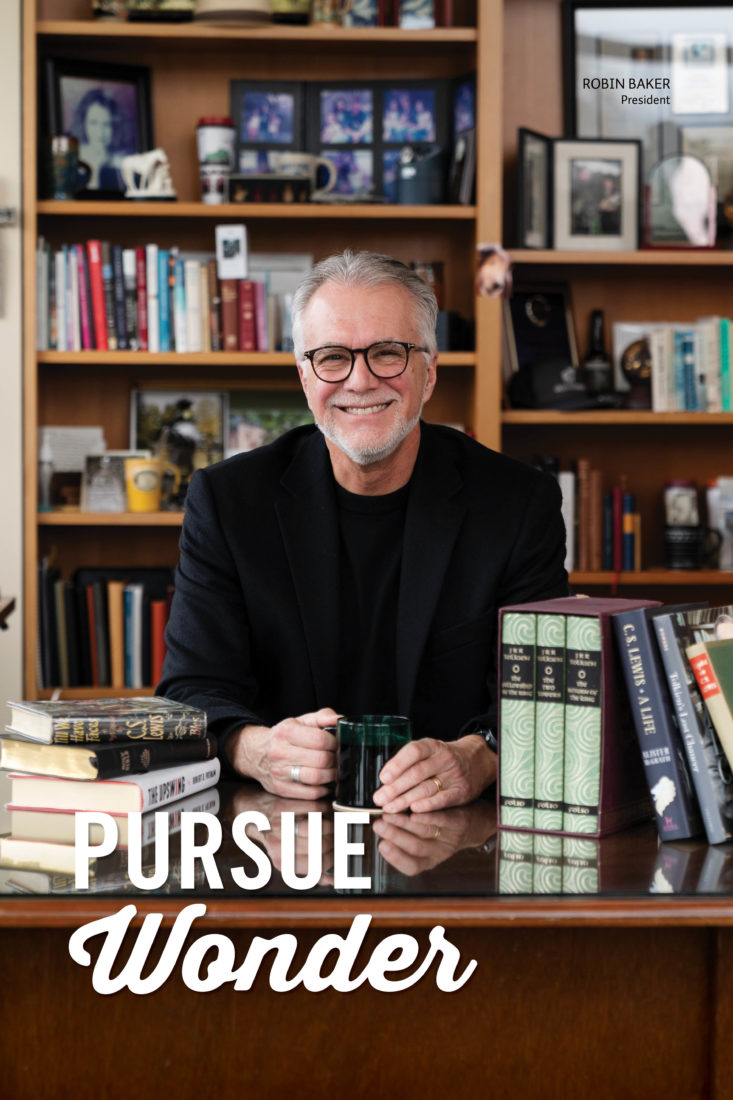Here at the George Fox Library, we’re invested in the virtue of wonder. Our collections connect us to the wonders of the world and inspire us to ask new questions every day. We hope to teach students to engage with wonder as they ask good questions and pursue truth. We also love being connected to the work and expertise of George Fox faculty and administration, and we are thrilled to continue the Pursue Wonder Project, a monthly feature with scholars from across campus to see how they connect wonder and hope to their work as teachers, administrators, and educators.
This month, we’re featuring Robin Baker, President of George Fox University. Check out his thoughtful responses to our interview below:
What’s something that you are curious about?
Outside of running, reading is my favorite activity. I could find a corner in the library or sit next to my fireplace and read books all day. Perhaps that is because my family read the Bible so much together. The Biblical record is essentially a story of how the God of the Universe is working out his purpose through his creation and the people he created in his image. As I became familiar with Biblical stories it was also natural to become curious in general about the nature of human work and activity. Why do we create communities? What makes life itself meaningful? Why do some people become great leaders in crisis — Abraham Lincoln — and others fail — James Buchanan? The questions and subsequent possible explorations are endless.
How do wonder and curiosity connect to your life as a scholar and instructor?
Without wonder and curiosity, scholarship, teaching and leading universities (administrating) would not exist. God is a creator and he made us in his image and likeness. We are most like him when we create. The process of learning is not really about memorization but about developing habits of wonder and curiosity. At our best we teach students how to learn and apply the learning process to important questions. Every technological innovation, scientific discovery, or medical treatment is the result of asking questions of why or how? I will never forget reading the biography of the Wright brothers and discovering that they ran a bicycle shop. If humans could develop different methods to move on the ground why couldn’t some of those principles be applied to human flight? Human life is wonder.
What do you hope to learn more about in the future?
I want to learn more about myself through the exploration of the lives of others — thus the interest in biography. This past semester I completed John Meacham’s biography of Lincoln and a recent biography of Elizabeth Elliott. Although these were two very different people, I came away from each story with a deep appreciation of the complexity of life.
Lincoln, with little or no formal education, became one of the most outstanding leaders of the American Republic. Elizabeth Elliott, a committed Christian, became a missionary with her husband to natives in South America who murdered her husband and other colleagues. Her life story was altered and she became a leading voice for women in ministry for an entire generation. Both Elliott and Lincoln were flawed people who were humble and people of wonder. They allowed others to contribute to their stories and their stories made a difference in their time. I love to learn about the people in this world.
How does the pursuit of learning connect to your faith?
It connects in every way. God created me for a purpose and the discovery of that purpose is the object of my life. Sometimes in Christian circles we use theological terms to describe this process — sanctification. I have trusted in Christ’s sacrifice and resurrection to cover my sins and now he is at work within me making me more like he has created me to be. The Apostle Peter was a different person at the end of his life than when he denied Christ the night before the crucifixion. He became different because God was at work on his heart but also because his heart and mind were open to learn, to be corrected, to see new paths. If I am not open to learn, then my faith is dead.
What about the things you are learning, researching, or teaching gives you hope?
Human stories are often tragic and we have plenty of examples of evil in our world. Humans chose to introduce chattel slavery into our world for economic gain. That system affected the lives of millions of people from Africa and other nations. At the same time, in the midst of all that pain, African-Americans developed a form of music, the spirituals, that were deeply hopeful — “Were you there, when they crucified my Lord.” Africans found a way to learn in the story of Christ that the God who created the universe became a human and suffered at the hands of those very humans who he sought to save. He was not a distant God but God who suffered with you in the midst of great sin — there was hope.
In the stories of leaders I find people who were also hopeful because they believed in their purpose and cause. One of my favorite works, The Lord of the Rings, Tolkien writes into the story a passage where Frodo and Sam have almost lost hope — darkness will win. But then, in the midst of all the darkness near Mordor, the clouds broke and the bright sky shone. As Sam noted, Mr. Frodo, the darkness is just a passing thing, it will not win in the end. I am hopeful because our lives have meaning and purpose and my study shows me that God is at work even in the midst of great pain to bring about his desired end.
